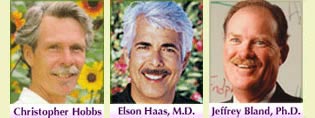The Detox Diet
Book Review by Janet Bridgers
The How-to & When To Guide for Cleansing the Body of Sugar, Nicotine, Alcohol, Caffeine, Chemicals and More
by Elson M. Haas, M.D.
In his book, The Detox Diet, Dr. Haas has made an invaluable contribution to the literature on detoxification that we have not seen in any other book. That contribution is specific plans for detoxifying the body of some of the most common consumable toxins, including sugar, nicotine, alcohol, caffeine, drugs and other chemicals.
These plans include detailed lists of supplements with dosages, plus dietary suggestions, as well as strategies for overall lifestyle and relationship approaches to successfully quitting a habit. The best of these is the chapter he devotes to nicotine withdrawal, definitely worthwhile for anyone who is seriously planning to quit and is willing to go about it systematically.
The downside to Haas's systematic approach to detox is that it starts to feel that he doesn't believe in half measures here. Maybe he can't advocate moderation as a health care professional, but "all or nothing" feels rather narrow to me.
The book begins with a note that I hope is not missed: "Ending your addictions is a serious undertaking. Going 'cold turkey' from sedatives stimulants, narcotics and alcohol can have very serious consequences, including seizures. This book is intended as a supplement, not a substitute, to the interventions of an experienced, professional healthcare practitioner." This prerequisite disclaimer addresses those with serious addictions, i.e. drug and alcohol dependencies. If you have them, and you are reading this, the point is well made.
He continues, in a similar, if milder tone, on the page entitled "Renewal."
"Abuses and addictions touch almost every person's life. I realize that the development of these habits is multi-faceted and as much a part of our social and cultural upbringing as they are our responses to dealing with a stressful family, school, work and society at large.
I don't want you to feel bad, weak, or inferior if any of these potentially destructive habits applies to you. I know the struggle between light and dark–between picking up that cup of coffee or glass of wine or that pack of cigarettes and the desire to stop or to never have started."
I wonder what tiny percentage of the population can truthfully say they are not addicted to alcohol, caffeine, sugar or drugs of any kind. Dr. Haas's potential readership is huge and I'm one of them. But personally I don't feel bad, weak or inferior because of my addition to caffeine. I feel entirely normal. At least I'm aware it's an addiction. Everything in moderation is my philosophy. I'm not an ascetic, don't intend to become one, and I feel aligned with 99.99 percent of the population in that one.
But I do believe in protecting one's health, and despite the fact that he makes me feel like an unrepentant sinner, I find Haas' book to be very useful. Though it's mostly a very left brain approach to the question of detoxification, throughout the book there are statements that give a glimpse to a decidedly spiritual side of Dr. Haas, such as the paragraph that states, "fasting is a catalyst for change and an essential part of transformational medicine. It promotes relaxation and energization [sic] of the body, mind and emotions and supports a greater spiritual awareness. Many fasters let go of past experiences and develop a positive attitude toward the present." This kind of thought is found in many books on detox and fasting and offers great hope to those who are somewhat hesitant about what this approach to health might mean. The answer is that it can be a great adventure for those ready to set sail!
